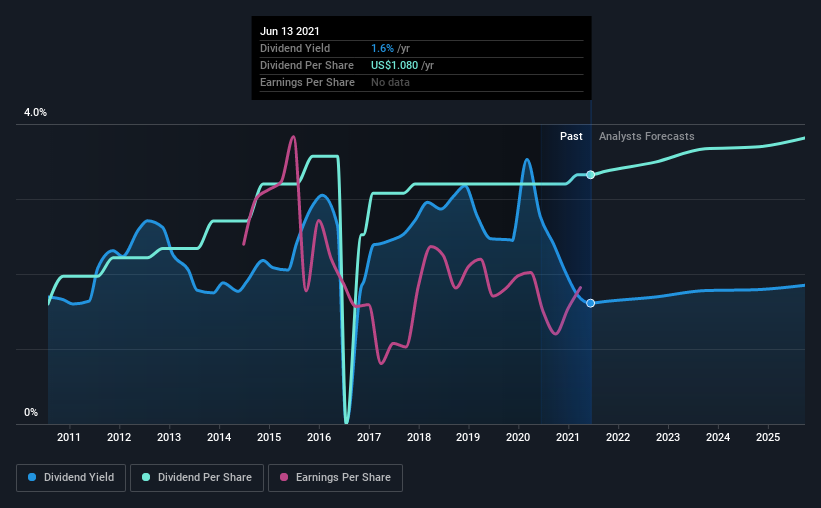Income Investors Should Know That Johnson Controls International plc (NYSE:JCI) Goes Ex-Dividend Soon
Johnson Controls International plc (NYSE:JCI) is about to trade ex-dividend in the next 3 days. The ex-dividend date is usually set to be one business day before the record date which is the cut-off date on which you must be present on the company's books as a shareholder in order to receive the dividend. The ex-dividend date is of consequence because whenever a stock is bought or sold, the trade takes at least two business day to settle. Therefore, if you purchase Johnson Controls International's shares on or after the 18th of June, you won't be eligible to receive the dividend, when it is paid on the 16th of July.
The company's next dividend payment will be US$0.27 per share. Last year, in total, the company distributed US$1.08 to shareholders. Looking at the last 12 months of distributions, Johnson Controls International has a trailing yield of approximately 1.6% on its current stock price of $67.04. If you buy this business for its dividend, you should have an idea of whether Johnson Controls International's dividend is reliable and sustainable. So we need to check whether the dividend payments are covered, and if earnings are growing.
See our latest analysis for Johnson Controls International
Dividends are typically paid out of company income, so if a company pays out more than it earned, its dividend is usually at a higher risk of being cut. Its dividend payout ratio is 82% of profit, which means the company is paying out a majority of its earnings. The relatively limited profit reinvestment could slow the rate of future earnings growth. We'd be concerned if earnings began to decline. Yet cash flows are even more important than profits for assessing a dividend, so we need to see if the company generated enough cash to pay its distribution. Thankfully its dividend payments took up just 31% of the free cash flow it generated, which is a comfortable payout ratio.
It's positive to see that Johnson Controls International's dividend is covered by both profits and cash flow, since this is generally a sign that the dividend is sustainable, and a lower payout ratio usually suggests a greater margin of safety before the dividend gets cut.
Click here to see the company's payout ratio, plus analyst estimates of its future dividends.
Have Earnings And Dividends Been Growing?
Companies that aren't growing their earnings can still be valuable, but it is even more important to assess the sustainability of the dividend if it looks like the company will struggle to grow. If earnings fall far enough, the company could be forced to cut its dividend. That explains why we're not overly excited about Johnson Controls International's flat earnings over the past five years. Better than seeing them fall off a cliff, for sure, but the best dividend stocks grow their earnings meaningfully over the long run. A high payout ratio of 82% generally happens when a company can't find better uses for the cash. Combined with slim earnings growth in the past few years, Johnson Controls International could be signalling that its future growth prospects are thin.
The main way most investors will assess a company's dividend prospects is by checking the historical rate of dividend growth. Johnson Controls International has delivered 7.6% dividend growth per year on average over the past 10 years.
Final Takeaway
Is Johnson Controls International worth buying for its dividend? Earnings per share have been flat and Johnson Controls International's dividend payouts are within reasonable limits; without a sharp decline in earnings we feel that the dividend is likely somewhat sustainable. In summary, it's hard to get excited about Johnson Controls International from a dividend perspective.
With that in mind, a critical part of thorough stock research is being aware of any risks that stock currently faces. To help with this, we've discovered 3 warning signs for Johnson Controls International that you should be aware of before investing in their shares.
If you're in the market for dividend stocks, we recommend checking our list of top dividend stocks with a greater than 2% yield and an upcoming dividend.
This article by Simply Wall St is general in nature. It does not constitute a recommendation to buy or sell any stock, and does not take account of your objectives, or your financial situation. We aim to bring you long-term focused analysis driven by fundamental data. Note that our analysis may not factor in the latest price-sensitive company announcements or qualitative material. Simply Wall St has no position in any stocks mentioned.
Have feedback on this article? Concerned about the content? Get in touch with us directly. Alternatively, email editorial-team (at) simplywallst.com.


